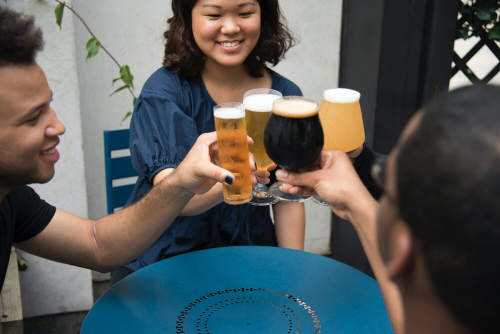How to drink beer ethically

It is a difficult period in craft beer, globally. With many of the well-known craft brewers now quite sizeable and moving into a second decade of operations, the focus has moved beyond the novelty and then the excellence of the beer brewed. Though these remain important issues, the new question is whether as business operations they match up to their claims that the beer they brew is modern and inclusive.
It has become clear that some craft beer operations don’t currently pass that test across a range of criteria. There have been a series of significant complaints from former employees of the brewers about their workplace culture, where bullying and harassment were often a feature. Big name craft brewers like Brewdog and Mikkeller have found themselves in the media spotlight.
So what is to be done? When should anyone concerned about drinking ethically steer clear of a brewer?
This isn’t about boycotts. It’s more about developing and popularising a campaign around what is good beer in 2021 and getting people to focus on that rather than some of the perhaps better known, but less desirable alternatives.
When the Tories’ Budget plans were announced in late October, to mark changes to beer duty both Boris Johnson and Rishi Sunak appeared at the Fourpure brewery in Bermondsey wielding empty kegs and pulling pints. The irony was that the changes didn’t actually apply to Fourpure. While its origins are firmly in craft beer these days, it’s owned by Australian beer company Lion which in turn is owned by Kirin in Japan. So in fact it’s not craft beer, but big beer.
The well-known beer writer Matthew Curtis had recently published an important volume on Modern British Beer (CAMRA). It looks at examples of some of the best of recent beer from around the UK, with the aim of getting those unfamiliar with some or all of them to try a glass and see what the changes in beer over the last 10 years or so mean for beer.
By way of introduction Curtis lays down five criteria by which he feels such beer should be judged. I’ve taken his criteria and provided a take on how people might look to drink ethically.
Focused on ingredients, their agriculture and provenance
Big Beer never does this but for many craft beers you can discover what hops have been used and what malt. Hops are often from the USA or New Zealand but Britain grows hops and is producing more, including new varieties of traditional hops such as East Kent Goldings and Fuggles. Ultimately the idea of moving hops around the world when they can be grown locally in the UK seems unsustainable.
Invested in the sustainability and the preservation of the environment
Curtis points out that production of beer and particularly Big Beer is not environmentally sustainable. Large amounts of water are used in the brewing process, carbon dioxide is used in production and in serving, and chemicals are used for cleaning. Brewing in 2021 relies on agribusiness for its raw materials of hops and malt and on modern industrial production techniques to make the beer.
One obvious way round some of this is to focus on cask beer, which requires no gas to serve it. Another is to use local hops and malt to avoid transporting the raw materials of brewing across large distances.
Curtis gives some examples of brewers that have sought to reduce their environmental impact. Brewdog, for example, has planted a significant number of trees in Scotland to reduce carbon impact. Some of this might be seen as greenwashing, but the number of breweries doing anything of note on the matter remains far too small.
Focused on regionality and is driven by and supportive of its local communities
Matthew Curtis makes the point that sameness – the same beer, the same style, available everywhere is the hallmark of Big Beer. Perhaps there is nothing much not to like about it, but then there isn’t that much to like about it either in many cases.
Modern beer aims to be different but it is work in progress. Curtis rightly points to a preponderance of murky, heavily hopped 5-6% pale ales and IPAs. Such beers may taste different depending on the hops used, water and exact recipe, but probably not that different. Rather modern beer should be about a range of beer styles with no limit on what might be tried. Hence mixed fermentation beers are more common, as is barrel ageing, and saison farmhouse type beers. What is brewed and what is drunk should depend not on decisions made in the boardrooms of big beer but what local communities like to drink. The problem that the ethical drinker faces is where to find such beers with the majority of pubs and bars either owned by Big Beer or supplied by it.
Inclusive and equitability minded
While this is perhaps the most obvious point in drinking ethically, in practice it’s one of the hardest to achieve. Modern beer has built an image of itself as progressive, against discrimination and for equality. The reality is often very different.
Craft beer, as a visit to any bar, taproom or event will underline, is predominantly about middle-aged, middle-class, white blokes. This is not surprising as the beer is usually far from the cheapest around, and so attracts those with disposable incomes and ample leisure time. Whereas those who actually work in the largely non-unionised and not well-paid bars that sell modern beer, or the breweries that produce it, are often not from that demographic.
There are of course more women becoming involved now, ready to challenge inequality and sexism, and the beginnings of an LGBTQ and minority ethnic presence too. Still, there is currently a yawning gap between what modern beer thinks it is and says it is and what it actually is. Change is needed!
Delicious
This point may seem obvious but its more complicated than it seems. A beer or a bar may tick a number of the modern beer boxes discussed above, but the bottom line is, is the beer good to drink?
It is clear from all these points that there is much campaigning work to do, and trade union organisation in brewers and bars would make a significant difference in some areas. But individual drinkers can also make positive choices about what to drink and where. Collectively and individually beer can be changed for the better.
Matthew Curtis’s book is one of the first to take a wider look at what beer should be in the 2020s for those determined to avoid the clutches of Big Beer and promote sustainable and ethical alternatives. We shouldn’t expect Big Beer to ignore the challenge. As elsewhere in cultural experiences, there is a continuous attempt to incorporate those who seek to challenge the capitalist status quo of a market economy, eg by directly buying up independent, co-operatively run breweries.
Ultimately the beer you drink is more enjoyable and more ethical if it’s a small part of building a sustainable, locally based cultural alternative to mega breweries and pub chains – if it’s about people not profit.

Keith Flett
Keith Flett is convenor of the socialist history seminar at the Institute of Historical Research and has been a member of CAMRA since 1975.
Latest from Keith Flett
- Brewing & Pubs: Notes from the first 100 days of the Labour government
- As Soon as this Pub Closes: Beer and the Election
- Recognise the union and bring in the punks! The future of Brewdog
- Wetherspoons and an alternative to the neoliberal capitalism of big pub chains
- Cask Ale, Private Equity and Class Politics
